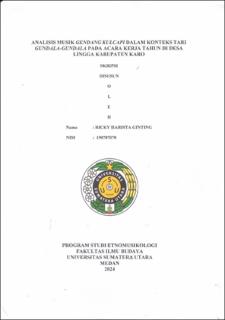Analisis Musik Gendang Kulcapi dalam Kontesk Tari Gundala-Gundala pada Acara Kerja Tahun di Desa Lingga Kabupaten Karo
Analysis of Kulcapi Gendang Music in the Context of the Gundala-Gundala Dance at the Year Work Event in Lingga Karo Village

Date
2024Author
Ginting, Ricky Harista
Advisor(s)
Rithaony
Sebayang, Vanesia Amelia
Metadata
Show full item recordAbstract
This study discusses the of gendang kulcapi music in the context of the "gundala- gundala" dance during the annual work event in Desa Lingga Karo Regency. The research aims to understand the presentation of the "gundala-gundala" and to analyze the music repertoire of gendang kulcapi in the context of the "gundala-gundala" dance during the annual work event in Desa Lingga Karo Regency. The research method used is qualitative research, employing various approaches, including data collection through fieldwork, interviews, observations, documentation, and laboratory work. In discussing the analysis of gendang kulcapi music in the context of the "gundala-gundala" researchers use the utilizes Djelantik's theory on Presentation to understand the form of presentation of the "gundala- gundala" Additionally proposed by Malm's theory on Pitch Weight is used to analyze the music repertoire of gendang kulcapi in the context of the "gundala-gundala" dance during the annual work event in Desa Lingga, Karo regency. The research findings reveal that, in the context of the "gundala-gundala" dance in Desa Lingga, Karo Regency, gendang kulcapi plays a key role. Gendang kulcapi is a traditional musical instrument that accompanies this dance, creating a cultural ambiance and supporting the movements of the dancers. Besides serving as accompaniment, gendang kulcapi also functions as a medium for conveying local cultural values. It is a crucial element in preserving cultural heritage and enriching the artistic experience and community engagement during the annual work event. Gendang kulcapi bridges the present with the past, fosters local pride, and celebrates the rich cultural identity. Gendang kulcapi is a musical ensemble that uses the kulcapi instrument, also known as gendang telu sendalanen, to play its main melodies. This ensemble consists of three main instruments: (1) kulcapi, (2) keteng-keteng, and (3) mangkuk. The repertoire of the gendang kulcapi ensemble in the context of the "gundala-gundala" dance includes (1) Silengguri, (2) Limbe, and (3) Tangtugut. Typically, the "gundala-gundala" dance begins with a tranquil and melodious opening melody. This melody may have a slow tempo, creating a serene atmosphere to introduce the narrative. As the dance's story progresses, the melodies in the gendang kulcapi ensemble's repertoire can change. When the story becomes more dramatic or emotional, the melodies may intensify and become more stirring.
Collections
- Undergraduate Theses [308]
